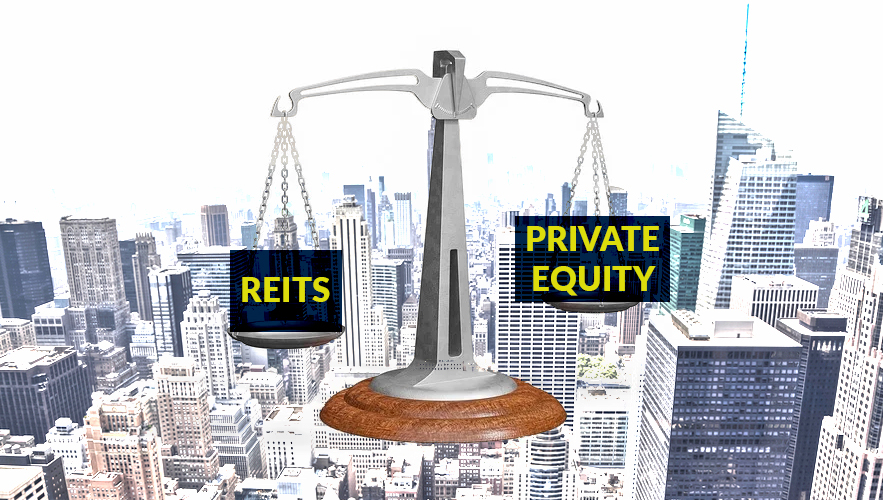REITs vs Private Equity: Which Passive Real Estate Investment is Right for You?

Real estate is king – this is nothing new. However, what IS new are the different ways to invest in real estate.
I know you’re sitting there thinking “No way am I unclogging toilets and shaking tenants down for their rent”, and I agree, you shouldn’t have to. Which is why passive real estate investments are becoming more and more popular and accessible to the masses. But with all these new ways to get involved, how do you know which is right for you?
Before deciding, let’s take a look at the two most popular options: REITs and Private Equity. It’s crucial to understand the distinctions of each to pick which route is best for you.
First up is a Real Estate Investment Trust (REIT). This is a corporation, trust, or association that invests directly in income-producing real estate and is traded like a stock.
Next, we have Private Equity. These are investments where funds are pooled together from multiple investing sources (individuals, family offices, etc.) to purchase a property or portfolio of properties, usually held in a Special Purpose LLC.
Although these are both passive investment options, they are vastly different. Three things to keep in mind when deciding which investment is best for you:
- LIQUIDITY
Publicly traded REITs are liquid, whereas most Private Equity investments are not. You can easily sell your investment stake in a REIT the same way you would buy or sell shares of Google. But, with the ease of trading comes pricing uncertainty. Be prepared to ride the roller coaster of the market, similar to your stock portfolio.
A majority of Private Equity investments have specified hold periods, usually between 3 to 10 years. While they may not be liquid, the illiquidity holds your emotions in check and prevents macroeconomic fluctuation.
- ACCESS TO DECISION MAKERS
Go ahead and call the REIT you’re invested with. You’re most likely going to speak with whichever client relationship manager picks up the phone and rarely someone with direct, property-level decision making authority.
On the flip side, with Private Equity you’re typically communicating with the direct deal sponsor, AKA a decision maker. This is one of the individuals who actually picks and manages the assets themselves, which is the same individual who’s putting their own money in the deal. More often than not, employees of the firm are also investors in the deal, so if one of the deal sponsors isn’t available, you’ll likely still be speaking with someone with direct knowledge of the property.
- OWNERSHIP
When investing in a REIT, you own an interest in a portfolio of 100’s of properties. Again, think stocks – when you buy stock in Google, you’re buying into the entire company and all facets of their business. You’re hoping the company does well, but you’re not the CEO, so you’ll never receive the full benefits from a record year. You’ll receive the same 7% preferred return that you did last year, while the partners buy new homes in the Hamptons.
When investing in Private Equity you become a direct owner in the physical real estate. As the asset does well, so do you. This means receiving a Schedule K-1 at the end of the year. In addition to your proportionate share of the cashflow, you also receive your pro-rata share of depreciation and tax write offs. In some cases, Private Equity Firms can also accept 1031 Exchange proceeds, as well as 401k and IRA funds. Private Equity investments can provide the benefits of direct ownership, while also benefitting from diversification and ridding yourself from the daily management headaches.
So, which passive real estate investment is right for you?
If you’re strictly looking for cash flow and liquidity, and don’t care about tax advantages, a REIT is probably your best bet.
If your goal is to receive the benefits of direct ownership and build wealth without getting your hands dirty, then Private Equity is most likely for you.
Both options can strengthen your portfolio and offer diversification, it just depends on your personal investment goals.
Adam Dickert is a Partner at Progress Realty Partners. He began his career with Marcus & Millichap as a commercial broker, establishing relationships with some of the most successful real estate owners, operators and investment funds. He spearheads the acquisition and deal valuation activities while overseeing the transaction process from first glance to closing. Adam utilizes his finance background to get a full grasp on the economics of each asset and implements ultra-conservative underwriting practices to ensure minimum risk, as well as steadily increasing returns for partners.
